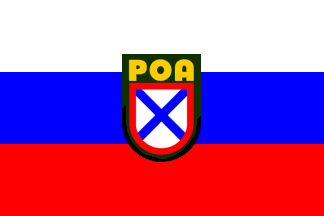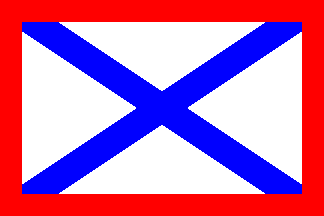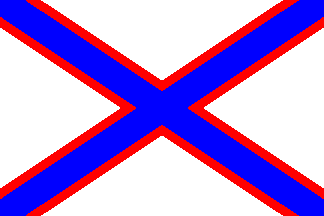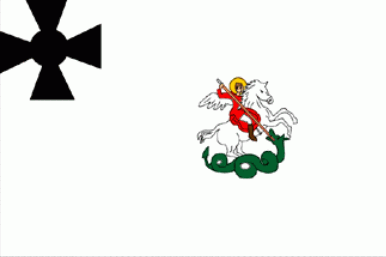
FOTW beschäftigt sich mit der Wissenschaft der Vexillologie (Flaggenkunde).
Alle auf dieser Website dargebotenen Abbildungen dienen ausschließlich der Informationsvermittlung im Sinne der Flaggenkunde.
Wir distanziert uns ausdrücklich von allen hierauf dargestellten Symbolen verfassungsfeindlicher Organisationen.
Last modified: 2021-08-26 by valentin poposki
Keywords: nazi | poa | roa | poha | rona | saltire (blue) | collaborationist | shoulder patch | coat of arms: bordure |
Links: FOTW homepage |
search |
disclaimer and copyright |
write us |
mirrors

Russian Liberation Army (Русская
Освободительная
Армия, whose
cyrillic initials are of course
РОА). This was Lt. General
Andrei Andreievich Vlasov’s army (rather an amalgamation of many units)
which reached about 750 000 men at its strongest point.
Santiago Dotor, 09 Jun 2000
The flag of ROA
was simply the Andrew’s flag
without red border. (Fotos of this flag with nazi-flag side-by-side at
Committee of liberation of peoples of Russia in Prague in 1944 known to
historicians.)
Victor Lomantsov, 01 Oct 2001
According to Andrey Jahwlanski, Sergey Drobiazko and George Mamulia in
Flag Report 17 [frp], ROA
used the white flag with blue St. Andrew’s cross (without red border)
and some units used the tricolor.
Jaume Ollé, 14 Jul 2001
.gif)
The ROA “coat of arms” was Argent, bordered Gules a saltire
Azure. That shield as a sleeve badge were placed on bigger one, which was
olive-green, with (yellow) letters "РОА" (it is ROA) in
chief of that darker shield.
Aleš Krížan, 19 Jun 2001
The ROA arm badge (really a patch) depicted a blue saltire on a white,
shield-shaped background, with a red border around the entire shield. The
red-bordered shield was itself located on a black background underneath the
gold Cyrillic initials "РОА". But the flag of ROA
was simply the Andrew’s flag
without red border.
Victor Lomantsov, 01 Oct 2001

According to Andrey Jahwlanski, Sergey Drobiazko and George Mamulia in
Flag Report 17 [frp], the ROA
used this emblem on the center of a
Russian tricolor and it was used by the Military
Committee for the Liberation of the Peoples of Russia.
Jaume Ollé, 14 Jul 2001

David Littlejohn [ltj87] says that
«The flag of the ROA was a blue saltire on white with a narrow
red edging», thus identical to the unit’s arm badge.
Santiago Dotor, 09 Jun 2000

The ROA arm badge (really a patch) depicted a blue saltire on a white,
shield-shaped background, with a red border around the entire shield,
not around the saltire itself.
Victor Lomantsov, 01 Oct 2001
This design, a Russian St. Andrew’s flag
with red fimbriation along the cross, was based in a misunderstating of the
original written description from [ltj87].
It was hosted in this site long enough to become
dangerously widespread. So, a word of caution: This flag design never
existed!
António Martins, 28 May 2007

RONA (or РОНА in cyrillic
characters) stood for "Russian Liberation Peoples’ Army"
(Русская
Освободительная
Народная
Армия), a grandiloquent title for the infamous 15,000-strong anti-partisan unit led by Bronislav Kaminski (who was shot by the SS under charges of looting). David Littlejohn in Foreign Legions of the Third Reich
[ltj87] speaks of no flag for the RONA, but describes and illustrates its arm badge as a fully-black Cross of Saint George (a Czarist order, a cross formy whose arms join in a small central disc crossed by two swords.
Santiago Dotor, 09 Jun 2000
Besides Vlasov's ROA, there was Bronislav Kaminski's Brigade (RONA/POHA - Russian National Liberation Army) which numbered 10,000 men. Kaminski's command was allowed by the Germans to have virtual control over a large chunk of the Russian territory (eventually the size of Belgium) in exchange for fighting the Soviet partisans. This area was known as either the ""Lokot Autonmy," or the "Lokot Republic," because it was centered in the small town of Lokot, near the city of Bryansk.
As the released prisoners of the gulags were not allowed to return to the big cities, the towns like Lokot were populated by many of them. Not surprisingly, these people didn´t have any liking for the Soviets. Eventually, Kaminski (interestly, of Polish-German extraction) was given the rank of Waffen-Brigadefuhrer (SS General) and his command was renamed the Waffen-Grenadier Division der SS (russische Nr. 1). In 1943, the Soviet offensive forced the Germans and Kaminski to relocate to Lepel, then he was ordered west to help quell the Warsaw Uprising in August of 1944. Kaminski, who hated the Poles for reasons only known to him, allowed his soldiers to commit unbelievable atrocities against the civilian population. They seemed only interested in pillaging, rape and robbery, and by this time his units had little military value. Eventually, he was arrested by the Gestapo, courtmarshalled, and executed. Apparently, his crimes were unimaginable even to the hardcore Nazis.
The Flag of the Lokot Republic featured the cross of RONA and the image of Saint George slaying the Dragon, a traditional Russian symbol.
Pete Loeser, 10 October 2014
The source requested was Flag Report 17, article “Symbols of anti-Soviet groups in the WWII, By Dr. Andrey YASHLAVSKY, and collaborations by Dr. Sergey DROBIAZKO (special thanks to Dr. George MAMULIA from Tbilisi, Georgia).
Jaume Ollé, 10 October 2014
Hosted by: Fanshop-Online.de und Handy-Shop.de
Tipp: Apple iPhone 12 im Shop